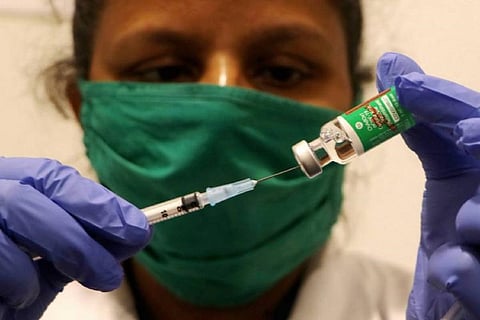

As of August 11, Bengaluru had recorded vaccine coverage of 95.03%, according to state government estimates, meaning that 95% of Bengaluru’s 18+ population has got at least one dose of the COVID-19 vaccine. In accordance with figures from CoWIN, only the national capital Delhi has administered more vaccine doses, at 1.11 crore, while the number for Bengaluru stood at 91.49 lakh as of August 12 evening. While these numbers show that Bengaluru is doing comparatively better than most other Indian cities, further analysis reveals the asymmetry in access to public health services in the form of the vaccine.
Till date, nearly 45% of these vaccine doses have been given in private centres, according to senior BBMP officials. Following the Union government policy, a single dose of vaccine costs a minimum of around Rs 800, which makes it unaffordable for many unless sponsored by their employers.
The unaffordability is evident as private hospitals are reportedly not able to administer their share of the quota of vaccines, as applicable under the present 75% government and 25% private formula. The problem most acutely impacts the 18-44 age category as vaccination for this age group began later.
While there is low demand in private centres, inconsistent supply and lack of a clear, transparent and consistent distribution policy has made the problem of shortage at free government setups more acute. There has been a steady drop in daily vaccination numbers in Bengaluru for a while now. The average daily vaccination in the city was 77,618 for the 10-day period starting June 28. The number had dropped to a daily average of 64,942 for the 10-day period starting July 8, and further to 49,747 for the 10-day period starting July 18. The number has slightly gone up to 52,459 for the 10-day period starting July 28 when the BBMP had been targeting 1 lakh vaccinations. This in turn has led to corruption at local levels in multiple areas.
Speaking with TNM, IAS officer D Randeep, posted as BBMP’s Special Health Commissioner, acknowledged that he has received complaints in this regard from at least three centres. These centres include Vasanthnagar PHC, Isolation Hospital in CV Raman Nagar and several facilities in Jayanagar. Jayanagar MLA Sowmya Reddy had written to the BBMP on August 7 regarding instances of alleged corruption in many centres, including the Jayanagar General Hospital. She has named two government medical officers whom she alleged had sold vaccines meant for free distribution. "They are taking money for vaccinations and despite having vaccine stocks, they would refuse to give vaccines to people, saying that there is no stock, and give it to those who would pay money," she wrote.
Randeep noted that official action is underway to probe the allegations stated by the MLA. In a similar incident, a BBMP nurse posted at Vasanthnagar PHC was sacked by BBMP zonal officers after resident activists found that she was selling vaccines meant for free distribution at the government set up. Residents had approached local MLA Rizwan Arshad for intervention.
However, another form of discrepancy has also come to light. While the average waiting period to get the injection at the Isolation Hospital is around 3-4 hours (including those with Co-win slots), a bribe of Rs 200 can lower the wait time so the vaccine can be received within an hour. A volunteer trying to help blue-collar workers in her locality, said, “Even though free, many workers of the unorganised sector do not want to get the vaccine, waiting in queues as they risk their daily earnings, which some of them cannot afford to lose especially in this current economic condition. Furthermore, those who can afford to get jabbed at private centres are using this Rs 200 facility and in the process save money and time leaving many in the low-income group vulnerable.”
The volunteer added, “It is not that the officials and political leaders are not aware of the situation, but they are shortsighted. How are we going to get out of this pandemic situation if a section is left vulnerable?”
Randeep said that once a complaint is sent officially, the BBMP will initiate due process.
He said that issues can be limited if they can institute a vial-by-vial audit, and that the BBMP is workong on how to implement that system. “Once there is a steady flow of vaccines, automatically these local issues will reduce. Another reason for these instances to increase is that the e-VIN portal has stopped functioning for the last few days,” he added. Independent of the Co-win platform, e-VIN (Electronic Vaccine Intelligence Network) has been used since 2015 to track and optimise vaccine distribution networks.
Arindam Roy, an activist with labour union AICCTU, is working to help increase access to the vaccine for migrant workers residing in the slums of Kempapura, Thubarahalli and Yelahanka. He stated that there is a lack of initiative from the government. “Our efforts to seek help from the BBMP despite multiple representations and meetings have not resulted in anything. These residents have been left to the mercy of NGOs who are arranging private hospital camps,” he said, adding, “Since most of the workers are not tech-savvy, localised vaccination camps are the most feasible option for them.”
Other activists also pointed out that in government centres, queues in the walk-in category could take hours, which means forgoing a day’s earnings, which often is not an option for many.
Randeep claimed that due to the present shortage in vaccine supply from the Union government, it is not possible for BBMP to conduct vaccination camps at slums or construction sites, as it has previously conducted in other locations.